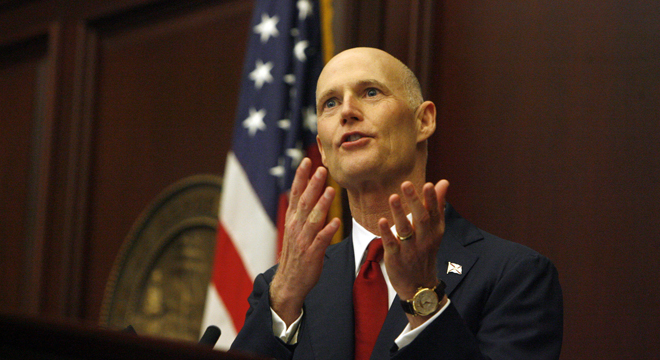Lawmakers in Louisiana may be pushing for greater ties between religious teaching and public-financed schooling, but Florida has opted for its own tack in introducing religion back into public education. This month, the state implemented SB 98, which allows students to read and recite “inspirational message[s]” at all non-compulsory school events, including graduations, assemblies and sports events. Teachers and school officials remain barred from any form of proselytizing – but, according to the new law, they can neither interfere nor direct the students’ speech.
The bill was signed into law by Gov. Rick Scott last March, and was passed by overwhelming margins in each chamber of the state legislature. Both House and Senate sponsors of the bill — one Democrat, one Republican — cited protecting students’ First Amendment rights as impetus for the bill.
While the state permits the study of religious literature in secular, objective instruction, and while the word “prayer” was ultimately struck from the bill’s final language, many see an obvious connection between the new law and the likelihood of proselytizing.
In fact, Rep. Charles Van Zant (R-Keystone Heights), SB 98’s sponsor, made sure to eliminate any question of the link between the bill and the reinstitution of prayer into public school. Commenting on the bill’s genesis, Van Zant said, “When we took school prayer … out of school, disciplinary cases went up, we had a lot more school vandalism, we had a lot more disrespect for schools, including the physical plant as well as school personnel, teachers and principals.”
In response to Van Zant’s sponsorship, Rep. Jeff Clemens (D-Lake Worth), asked if a student could, at the start of an assembly, read, “We believe Satanism to represent the reawakening of pagan spirituality, which with the foundation of National Socialism, will usher in the new Aeon.” Replied Van Zant, “That would be the student’s prerogative, because of our First Amendment right of free speech.”
Despite the strong majorities passing the bill, SB 98 faces numerous detractors. The ACLU of Florida and the Anti-Defamation League both issued warnings about potential lawsuits when Scott signed the bill in March.
Americans United for Separation of Church and State, meanwhile, penned a letter to Scott, urging a repeal of the legislation. The letter, signed by clergymen, noted that the group had come to the consensus that “this bill would violate the First Amendment to the US Constitution and is disrespectful of the religious diversity that makes our state and our nation great. … Forcing prayer upon public-school students not only violates the rights of those students, it also demeans the spiritual significance of religious belief.”
Family Policy Council, one of the state’s strongest anti-gay and anti-abortion groups, also signed on with the opposition, along with the Liberty Counsel, a conservative Christian legal group. Both cited “major constitutional problems” and the likelihood of litigation costs as reasons for disapproval.
Schools, meanwhile, have been slow to sign on to the bill. Wayne Blanton, executive director of the Florida School Boards, cited potential lawsuits as sufficient enough to avoid implementation. “Nobody’s going to do it,” Blanton said last week. “We are telling [schools] it will be costly and not worth the effort.” Blanton added that only one school district has considered applying the law, and that the bill’s passage seemed more attuned to November electioneering than actual educational policy.
Blanton’s comments come in light of a recent ruling that saw Florida’s Santa Rosa County lose a prayer-in-school case that lasted four years, which, according to the The Palm Beach Post, ultimately cost the county’s taxpayers $900,000. No lawsuits have yet moved forward in regards to the new law.
When Scott initially signed the bill into law in March, he announced its passage view his Twitter and Facebook accounts. He followed the announcements with his stock sign-off: “Praise God.”






